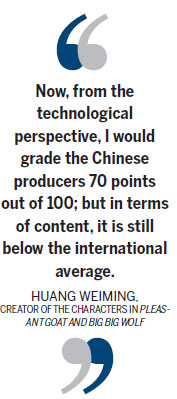Big big journey for Pleasant Goat
Updated: 2015-06-05 06:03
By Wang Chao(China Daily Europe)
|
|||||||||||
Mickey Mouse, Take note: China's blockbuster cartoon characters are going out into the world
Having overwhelmingly won the Chinese market, the goats and wolves from the Green-Green Pastures are doing what many Chinese movers and shakers are doing - seeking new and profitable pastures on different shores.
Pleasant Goat and Big Big Wolf, the flagship cartoon series of Guangdong Alpha Animation and Culture Co, already can be seen on TV screens, movie posters, backpacks, clothing, cups and all manner of goods in China.
|
Characters from Pleasant Goat and Big Big Wolf appear at a parade in Amsterdam, the Netherlands. Photos provided to China Daily |
|
People take pictures with characters of Pleasant Goat and Big Big Wolf. Photos provided to China Daily |
The firm, established in 1993 and one of the country's biggest animation and culture companies, was listed on the Shenzhen Stock Exchange in 2009. But now it has even bigger ambitions.
In China, Pleasant Goat is virtually a lock for the most broadcast cartoon in the decade since its debut in 2005. The company has made seven movies and more than 1,300 episodes of the adventures of the denizens of Goat Village and their often bumbling antagonists - the wolves. The movies have earned box-office revenue of 800 million yuan ($129 million; 118 million euros).
Zeng Weibin, public relations manager of Alpha, says 2015 will be the year to build "international goats and wolves".
Beginning this year, episodes of Pleasant Goat and Big Big Wolf are getting airtime on several Chinese TV stations in the United States and Canada.
This spring, the main character, Weslie Pleasant Goat, was chosen as the representative of Chinese cartoon characters at the Netherlands' international flower show, where the series was introduced to children in Europe via a float in the annual flower floats parade.
The goats also are going to Hollywood, the major international target for Alpha. Last year, the company formed a strategic partnership with Hollywood movie production company New Regency to jointly make movies for the international market.
The company's going-global efforts started in 2009, when it began to broadcast Pleasant Goat episodes on the Asian channel of US network Nickelodeon in 13 Asian countries and regions.

In 2010, the first goat and wolf movie, The Super Snail Adventure, which had been released in China the year before, was screened in more than 50 countries in more than 10 languages, including English. The movie was broadcast in India in different languages.
Alpha also is drawing other popular characters under its roof. Last year, the company bought the rights to use the Spanish-South Korean-French computer-generated cartoon series Bernard, known as Backkom in South Korea, for broadcast in Asian countries.
Alpha holds distribution rights in Asia and the Middle East to South Korea's preschool Super Wings! cartoon, which follows jet plane Jett, who travels around the world delivering packages to children. The show is co-produced by South Korean, Chinese and US companies, according to a recent report by kidscreen.com.
Alpha is also the master toy partner for the show, and newly launched Auldey Toys of North America (an Alpha subsidiary) will launch the initial US toy program with Toys 'R' Us in October, before a national retail rollout next spring, Kidscreen reported.
"This is our overseas strategy: We make these cartoons with professional cartoon makers and post-production teams, and we broadcast them overseas first. Then we bring them back home and screen them in China. It's so surprising that children from all over the world share the same love for certain characters," Zeng says.
In each episode, Super Wings! has a different country as the setting, so it fits with the cultural background better, he adds.
As it goes overseas, the company wants to include more Chinese elements. "We want to strengthen the Chinese features in these movies and episodes, and we hope Chinese elements will sail far overseas," says Huang Weiming, creator of the famous goat and wolf characters. "Mulan and Kung Fu Panda are Chinese characters, but their success doesn't belong to us, but belongs to Hollywood."
This might be a difficult goal to achieve because even Japanese cartoon movies have yet to break into mainstream culture in the West, and China's cartoon industry is behind Japan's, he says. But it is easier to internationalize cartoons than internationalizing regular movies because cartoons are less culture-related, he adds.
As business expands, Alpha's revenue is becoming more diversified. According to Zeng, the company's direct revenue comes from the box office, authorized broadcasting and sponsorship, while indirect revenue is from brand licensing, such as authorizing backpack manufacturers to put Pleasant Goat characters on their products.
The contribution fluctuates year by year, but the trend is for indirect income to surpass direct income, says Huang.
"As far as I know, the ratio between direct box-office revenue and indirect revenue at Disney has reached 3-to-7, so there is still a huge market for us to tap."
Huang says good characters have a "long-tail effect", which means that if the cartoon image is strong enough, consumers will keep buying related products for a long time, even if the cartoons are no longer being screened.
This year, sales of consumer products bearing Pleasant Goat images are expected to exceed 1 billion yuan, the company says.
Alpha officials recently have said they have a vision of "building a new Disney in the new era", and announced it will create an industry chain covering toys, games, movies and online education. "We will also consider building a theme park," Huang says.
The medium-stage plan is to introduce puppet shows with goats and wolves across the country. "We have already formed a partnership with a Taiwan company to design the stage shows," Zeng says.
The plans are exciting, but Song Lei, an analyst with the China Association of Animation, says that compared with Western countries where the cartoon industry is mature, the Chinese cartoon industry still has a long way to go, even for industry leaders such as Alpha.
The Chinese industry has been under the shield of the government for a long time, and they should go out and take on real competition, he says.
In 2006, the Chinese government issued a policy saying foreign cartoons may not be broadcast during prime time (5 pm to 8 pm) and, as a result, many Chinese companies have been shielded from direct competition from Western companies.
Huang from Alpha agrees that the government did protect many companies from fierce competition, given that the Chinese cartoon industry was at least 50 years behind the West.
"If we had faced competition from Western companies at the beginning, nobody would have survived. But as we get stronger, the competition inside China has phased out some small and weak companies, and the survivors are growing more healthy during this process," Huang says.
Now many Chinese companies are serious contenders in the cartoon business. Still, compared with Western countries, there are some major weaknesses, Song says.
"Now, from the technological perspective, I would grade the Chinese producers 70 points out of 100; but in terms of content, it is still below the international average.
"In whatever case, content is always king, and only by building good cartoon characters can we earn the indirect revenue related to it."
wangchao@chinadaily.com.cn
(China Daily European Weekly 06/05/2015 page22)
Today's Top News
65 bodies found, more than 370 still missing
Ex-FIFA executive detailed bribes in 2013 secret guilty plea
Beijing 'shocked' at Nazi comparison by Philippines
Ship disaster in Yangtze River: Roundup of updates
HK economy will suffer if reform fails, tycoon says
Blatter rocks world soccer by quitting FIFA amid scandal
Obama signs bill remaking NSA phone records program
China's Dalian Wanda buys Australian cinema chain Hoyts
Hot Topics
Lunar probe , China growth forecasts, Emission rules get tougher, China seen through 'colored lens', International board,
Editor's Picks

|

|

|

|

|

|








